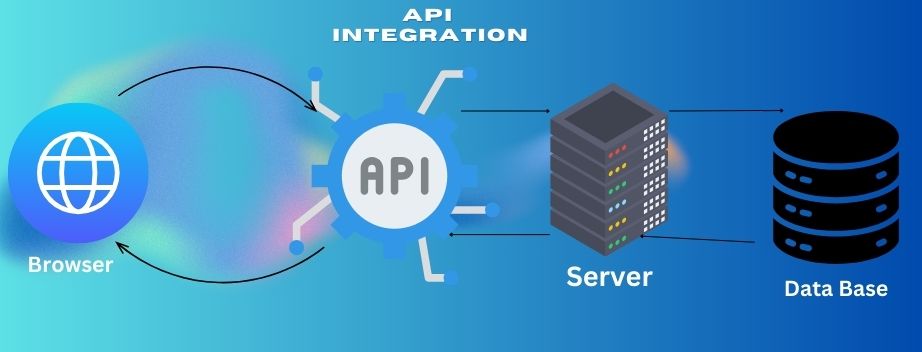
Today, the world is increasingly full of technologies, and connectivity means various software systems and platforms that businesses use. They have WhatsApp to send messages to customers. online payment processing; management of a marketing campaign; and even use a CRM system amongst others. It simply means they need to 'talk to each other' and transmit seamless data.
In such a case, then API integration becomes very important. API is actually an interface between two or more software systems that enables the connection and flow of communication between each other. It streamlines business activities and really makes them much more efficient.
Our Guide brings out the importance of API integration, how it works, and practical usage of such APIs through various ways, which include WhatsApp API integration, a payment gateway API, Mailchimp API, and Salesforce API.
API integration happens whenever two or more applications are connected through their APIs in order to communicate and to let them share data, thus coordinating the operations of each other. In short, APIs are rather like those links between disparate systems, enabling data exchange without direct intervention.
Imagine having an online store. Here, you might have one to manage sales another for email marketing, and yet another just simply to receive payments. And instead of moving the data among all these one by another, which is kind of a slow process and also error-prone, API integration automates everything and therefore reduces errors saves time, and makes things much more efficient.
Above all else, an API offers integration-a fundamental element of any digital transformation process. Most businesses looking to scale and grow rely on linking their in-house tools with external services and platforms.
there are several reasons why API integration is a high priority for businesses in this century:
Whether it's a WhatsApp customer-communication API or a payment gateway API for easy, hassle-free transactions, APIs help in streamlining business operations and positively affecting the feelings of customers with them.
API integrations may be used in several sectors of a business. Some common examples are as follows:
In the age of instant messaging, the only way to engage with a customer is through real-time service. To this regard, businesses need WhatsApp API integration for allowing customers to access their services and interact with them instantly. This WhatsApp API integration can allow automated messages, send out notifications, and even provide avenues for support.
For example, a business can employ the WhatsApp API for confirming orders, informing customers of shipment details, or for answering customer queries-all of these in real-time. This is certainly the type of communication that involves efficiency coupled with customer satisfaction in knowing that they will get instant answers that are often linked to today's fast-paced world.
E-commerce would go for nothing without online transactions. Processing online payments with a payment gateway API is safe and smooth. Adding several payment options-the likes of credit cards, debit cards, and digital wallets, for instance-would make your website or app much more convenient for your customers.
For example, PayPal, Stripe, and Razorpay each have a payment gateway API. These APIs allow businesses to accept payments over a secure connection still through their site or mobile app. The transaction is processed, and the details are verified for the final payment without ever taking the user away from the site.
Email marketing, probably one of the most popular marketing strategies and by virtue of that, Mailchimp being one of the most commonly utilized ones that companies leverage in the management of email campaigns. Integration of the Mailchimp API goes beyond making email marketing more manageable; however, it can actually automate and personalize campaigns to make them highly effective.
With Mailchimp API integration, businesses can synchronize customer data across their platforms, activate emails triggered based on user actions, and manage audience segmentation more efficiently. Whether it is that welcome email to the new subscriber or the checkout abandoned cart follow-up, the Mailchimp API makes sure your emails are timely and relevant.
Salesforce is a leading software product in CRM (Customer Relationship Management). With Salesforce API integration, companies can tie the CRM along with their other websites, like e-commerce website, social media tools, and email marketing services to centralize their data and automate workflow.
For instance, by integrating Salesforce API, a company can push customer data residing in their website or marketing tools directly into Salesforce. This essentially means a sales team would have the immediate availability of information regarding customers, and hence they can make an informed decision with regards to customers and further follow up on their relationships.
Most businesses have different needs, and there are certain things that cannot be solved with any generic off-the-shelf tool. Custom API integration does enable businesses that have different needs to have tailor-made solutions that connect their proprietary systems with external platforms.
Custom API integrations could include linking an HR system within a company to other companies' third-party payroll platforms or IoT devices to cloud analytics. The tremendous flexibility of APIs enables the design of custom integrations for almost any business process.
The process of API integration does sound technical, but the concept is actually quite simple. APIs allow for two software systems to communicate with each other through the sending of requests and receiving responses.
Simplifying, that would be:
All of this back-and-forth communication happens in the span of seconds to ensure that no user experience is affected or interrupted.
there are still some challenges associated with integrating the same. With regard to the pitfalls that businesses need to put in mind:
Another compatibility issue is that not all APIs are compatible with each other. This would create conflict if you are connecting to several systems. Therefore, make sure that the APIs that you will implement are highly documented and compatible with your existing infrastructure.
Security Risks : APIs can also expose sensitive data. Hence, security becomes the main concern. Businesses need to put up robust security through encryption and token-based authentication on data.
Maintenance: APIs are always being written. You need to regularly update your code to catch up on any new features and security patches. If you do not maintain API integrations, you are going to have functionality issues as well as security vulnerabilities.
Data Privacy: Such integratio ns demand massive responsibility in the handling of user data, particularly against the stringent regulations of GDPR. Businesses need to fulfill all the relevant data protection laws so that their API integration process does not come under violation.
More in the future, as corporations look to deploy more digital technologies, this API integration will be highly crucial. Added to AI and machine learning, we can expect to see more intelligent APIs that are able to process information in real-time and be able to adapt to changing business needs.
More importantly, new APIs will be developed for emerging industries, including fintech, healthcare, and e-commerce. For example, more sophisticated payment gateway APIs could be designed by fintech companies, whereas healthcare providers may use API integration to exchange patient data in a secure manner with other systems.
For attaining smooth integration of an API into the businesses, companies must therefore follow these best practices
In the digital world, API integration is the only way that a company can make a smoother path and streamline its operations while offering its users the most intuitive experience. Examples of API integration include integrating a WhatsApp API for communicating with customers, integrating a payment gateway API for secure transactions, or integrating with Salesforce to manage customer data-all of which provide the foundation of digital connectivity.
A correct understanding of API integration can help businesses in utilizing this to unlock opportunities for growth and efficiency. Businesses using properly planned integration can automate certain processes, thereby reducing error, and subsequently scale operation with much ease to ensure long-term success.
Remember that in this fast-evolving world of technology, the only way to hold on to your edge in the competition is to be ahead with the latest trends and best practices on API integration.
Q:How does API Integration help in automation?
Ans: It lets companies initiate automated processes of data syncing, order processing, and automated emails, among others, thereby averting the pressure that comes with human efforts and limits the potential for errors.
Q: What is Custom API Integration?
Ans: It involves developing a custom, tailor-made API connection between disparate or proprietary business systems with external platforms in a quest to solve specific needs that are not catered for by off-the-shelf APIs.
Q: How can businesses ensure secure API Integration?
AnS: It is possible that businesses can make their API integration secure because of the help of encryption, token-based authentication, with security protocols, and updated APIs regularly.
Q: When should I use WhatsApp API integration?
Ans: You should use WhatsApp API integration when you want to strengthen the communication line between your customers through automated messages, notifications, or real-time customer support via WhatsApp.
Q: How does API integration enhance the experience of customers?
Ans: APIs provide clients with the real time response, custom services, and frictionless transactions that just get added together for faster, more convenient interactions.
 Kanhu Charan Behera
Kanhu Charan Behera
Copyright @2020. All Rights Reserved by WEB DIGITAL MANTRA IT SERVICES PVT LTD
Post Reviews